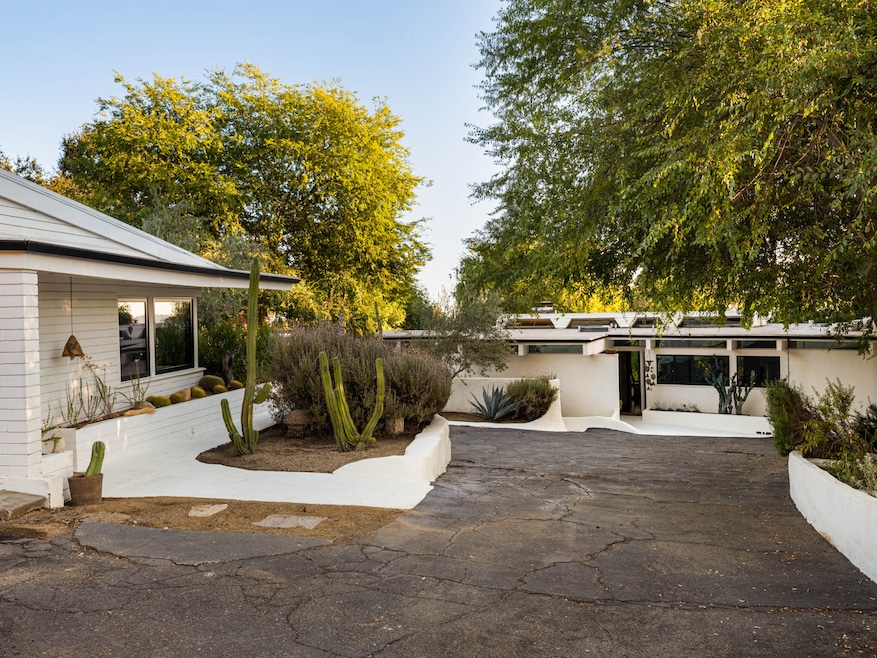When the Eaton Fire tore through Altadena, California, earlier this year, it left little but rubble on its path.
Streets once adorned with charming and quirky residences were reduced to dirt lots dotted with chimneys and burned-out cars. Every few blocks though, a collection of still-standing homes remained, valiant against the otherwise catastrophic backdrop.
One of those blocks: Jaxine Drive, an enclave of architecturally significant homes nestled into the foothills. Many of the properties on Jaxine didn’t survive the fire, but there’s at least one that did, and now it’s for sale.
The two-structure residence at 176 Jaxine Drive hit the market last week, asking just shy of $2.45 million, according to a listing on Homes.com.

A historic home from the 1940s that survived the Eaton Fire
The property dates to at least 1949, according to listing agent Kate Blackwood of Compass. That’s when the original owner, locally renowned sculptor David Oliver Green, commissioned a studio built by Frederick Monhaff at the site.
“Outside, there’s a furnace because he did steel sculptures, and he worked there,” Blackwood told Homes.com in an interview.
In 1964, Green and his wife, Jaxine — for whom the street was named — worked with architect Randell Makinson to build a three-bedroom, two-bathroom main house. At the time, the development “inspired that pocket,” eventually bringing more architects to the street and creating a sort of artistic enclave, according to Blackwood.


Today, both structures are still standing, most of their original details maintained. The studio is now a one-bedroom guest house, and the current owners oversaw some updates and restoration in the main house after they purchased it in 2015, according to Blackwood.
Pricing a home that's in the midst of destruction
When it came to pricing and listing the home, Blackwood said she worked closely with an appraiser, given the circumstances.
To determine an appropriate listing price, they first knocked about 10% to 20% off the home’s estimated value six months pre-fire. Then, they accounted for the home’s location and the uncertainty of what the future holds for Altadena.
“It was this coveted hill that backed up to the forest where no one would build, and there were walking trails, a real lifestyle,” Blackwood explained. “Now, it’s barren and you’re missing a lot of neighbors. And then, there’s building that’s going to come, and there’s the road that needs repair.”

That said, Blackwood and the sellers decided to list the home a bit below what the appraiser suggested.
“We wanted to be sensitive to the lifestyle now and what everyone would have to go through,” she said.
In the seven or so days since it went live on the public market, the property has already garnered significant attention. Blackwood said an open house event over the weekend drew visitors from all across the Los Angeles region, including displaced residents from the Pacific Palisades, another neighborhood that was damaged by January’s firestorms.
“Altadena is full of opportunity now,” Blackwood said, “and I think there’s a lot of people who want to let go and move on, and it’s time for the new guard, I guess.”
Architecturally significant listings are finding success this fall
As of Monday, there was a full-priced offer on the home that was still under negotiation, according to Blackwood.
It’s part of a growing trend in the Los Angeles area — especially in neighborhoods damaged by this year’s fires that have experienced a lopsided real estate market since January.

In short, architecturally significant properties are still in high demand, even when the market conditions aren’t perfect.
There’s Blackwood’s Altadena property that’s on track to go under contract soon. There’s an original Richard Neutra home in the Pacific Palisades that found a buyer just 19 days after it was listed for $10.5 million. There’s a South Pasadena home designed by Buff and Hensman that sold roughly a month after listing for approximately $3.03 million, 10% more than asking.
“Everyone loves architecture,” Blackwood said.
